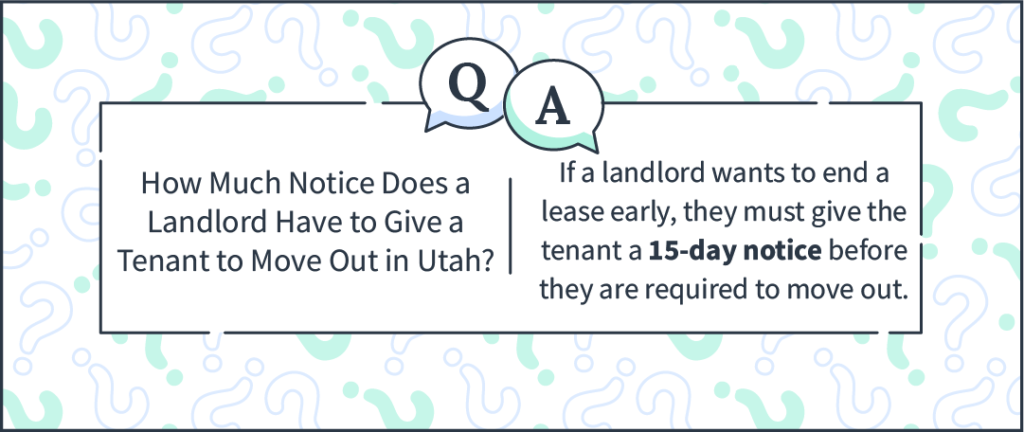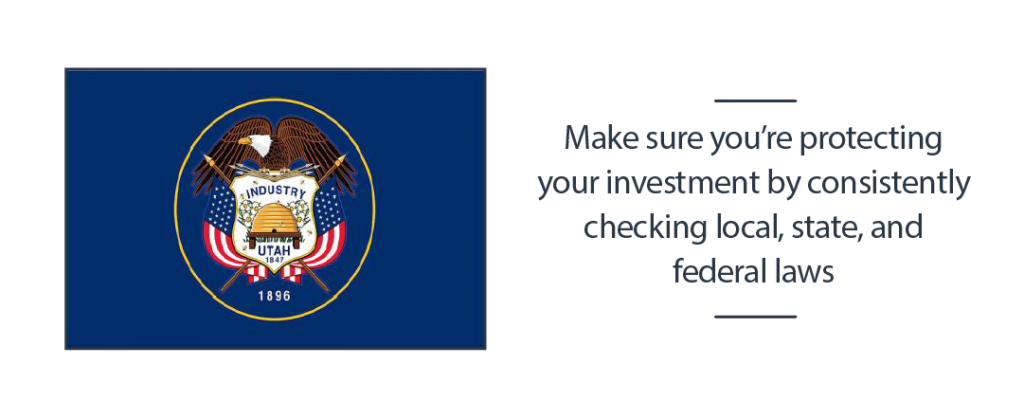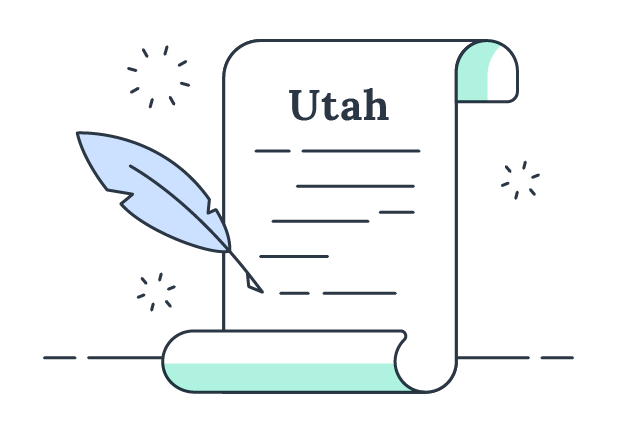Utah has been a hidden gem in the southwest for ages, and now people are finally starting to catch on. Not only was Utah the fastest-growing state in 2020, but it also had one of the best economies and job markets in the country. The quality of life is what largely drives people to the state. With a diverse environment ranging from mountains to desert, many sports teams to cheer on, and excellent family-friendly activities like museums, Utah has something for everyone. The low cost of living is also a big draw for people looking to make Utah their home – the cost of living in Utah is 32.3% lower than in California, which adds to the appeal. Utah is a great place to invest in rental properties, or be a renter yourself.

Laws that impact the rental market, landlords, and tenants are constantly being decided in states. Make sure you know what’s on your ballot – find Utah voting information.
Marketing. Applications. Leases. Payments.
Utah Tenants’ Rights and Landlord Responsibilities
- Must return security deposit within 30 days
- Landlords aren’t limited on how much they can increase rent or how often
- Must provide 24-hour notice before entering
- Tenants may make repairs and deduct the cost from rent
- No limit on late fees
When it comes to Utah rental laws, there are a few specifics landlords need to know:
- Security Deposits – Utah does not have a law placing a maximum on security deposits; however, landlords are required to return the deposits within 30 days of a tenant moving out or within 15 days of receiving a forwarding address.
- Rent Increase – Utah does not limit landlords on how much they can increase rent by, or how often. Because there are no rent control laws, landlords may charge whatever they deem acceptable for rent.
- Entry Notice – Utah requires landlords to provide a 24-hour notice before entering the rental property unless it is an emergency.
- Repair and Deduct – The repair and deduct statute allows tenants to make repairs if the landlord fails to do so where they can then deduct those costs from their next rent payment. Tenants may not deduct more than two months of rent even if the repairs cost more than that.
- Late Fees – Landlords may charge any late fee for late rent payment and they aren’t required to disclose these fees in the lease.
Utah Landlords’ Rights and Tenant Responsibilities
- No notice needed to terminate a lease
- Tenant has three days to pay rent before landlord may file for eviction
- A tenant has 15-days to claim abandoned property
- Victims of domestic violence may terminate their lease
- Lease Termination Notice – Month-to-month renters are required to give a 15-day notice of lease termination, however, any other types of renters aren’t required to give any type of notice.
- Eviction – If a tenant fails to pay rent, the landlord must give them a written notice that gives them three days to pay. If they fail to make the payment, the landlord may file for eviction.
- Abandoned Property – If a tenant moves out and leaves personal property, the landlord must send them a written notice and give them 15-days to claim the items. If the tenant does not claim the property, the landlord may sell or throw away the items.
- Special Protections – Victims of domestic violence may terminate their lease as long as they provide their landlord with written notice of termination and a protective order protecting them from the perpetrator of the violence.
Rental Application Fee
There are no additional rental application fee laws in Utah.
Criminal Background Check
- HUD (Federal) laws do not classify criminal backgrounds as a protected class, but making a decision to rent based off a criminal background alone could lead to a discrimination charge as it impacts certain protected groups of people disproportionately.
- However, if the criminal background check revealed a crime for the manufacture and distribution of drugs, homicide and/or stalking, denying the application is allowed.
- Landlords should have a consistent and equal policy or procedure in place to follow regarding criminal background checks so as not to discriminate against one class of people over another.
- HUD states that a landlord cannot ask about arrest records, only convictions, as innocent people are commonly arrested though the situation may not have resulted in a conviction.
- Some municipalities may have written their own laws expanding onto what you can and cannot ask regarding criminal backgrounds during the tenant screening process.
Repairs
Tenants must notify their landlord of repairs needed and can request that the landlord make the repairs within 1-10 days (depending on the severity of the problem) or do the repair themselves and deduct the cost from their rent.
Late Fees
Landlords may charge a maximum late fee for unpaid rent of $75 or 10% of the monthly rent, whichever is greater.
Disclosures
Landlords must disclose if they have knowledge of any possible methamphetamine contamination on the premises.
Build a Utah lease agreement in less than 15 minutes.
Utah Lease Agreement Example
There are three sections to a residential lease agreement. The first section outlines the custom details of the contract, such as who’s involved and for what address. Here’s an example Utah lease agreement listing details found in Section 1:
| Property Address: | 1200 Broadway Ave. Unit #104, Salt Lake City, UT 84044 | |
| Lease Start Date: | 3/01/21 | See section 1.5 |
| Lease End Date: | 2/28/22 | See section 1.5 |
| Total Monthly Rent: | $1,620.00 | See section 1.6 |
| Monthly Base Rent: | $1,500.00 | See section 1.6 |
| Monthly Pet Rent: | $120.00 | See section 1.6 |
| Prorated Rent Amount: | $1,000.00 | See section 1.10 |
| Total Deposit(s): | $1,500 | See section 1.8 |
| Security Deposit: | N/A | See section 1.8 |
| Pet Deposit: | N/A | See section 1.8 |
| Other Deposit: | N/A | See section 1.8 |
| Total Non Refundable Fee(s): | $100.00 | See section 1.9 |
| Move-in Fee: Description | $100.00 | See section 1.9 |
| Late Fee: | 10% or $75, whichever is greater, if not paid by the 5th. | See section 2.1 |
Utah Landlord-Tenant Law FAQ
Below are brief answers for some of the most commonly-asked questions when it comes to landlord-tenant laws in Utah.
Can You Withhold Rent in Utah?
Renters are able to withhold rent under the repair and deduct statute if a landlord fails to make necessary repairs. The tenant must provide notice that they will be deducting repair costs from the next rent payment at least three days before the payment is due. They also may not deduct more than two months of rent, even if the repairs cost more than this amount.
How Long Does it Take to Evict a Tenant in Utah?
There are three reasons a landlord may evict a tenant. Failure to pay rent, a lease violation, or performing illegal acts. In each case, the landlord must provide the tenant with a written notice that gives them three days to cure the violation. If they fail to cure, the landlord may file for eviction.
Is Utah a Landlord-Friendly State?
Utah is a somewhat landlord-friendly state. There are no rent limitations and the eviction process is quicker than other states. Courts also typically award triple the damages in the event of an eviction.
What is the Eviction Process in Utah?
Before filing for eviction, landlords must provide a three-day notice to their tenants before filing for eviction. If the tenant does not cure their violation in this time period, the landlord may file for eviction. Utah has a quick eviction process – from the time the landlord files to when the tenant moves out is typically only a few days to a few weeks.
How Much Notice Does a Landlord Have to Give a Tenant to Move Out in Utah?
If a landlord wants to end a lease early, they must give the tenant a 15-day notice before they are required to move out.
Due Diligence and Utah Rental Laws
TurboTenant has utilized many municipal sources along with official state statutes in order to compile this information to the best of our ability. However, local laws are always in flux and landlords and tenants alike should be sure to do their due diligence and consult legal help when it’s needed. We hope the following list can serve as a valuable resource and allow you to succeed as a landlord or tenant in Utah. Be sure to take proper precautions when it comes to finding the top candidates for your unit by utilizing our online rental application and tenant screening services.
Disclaimer: TurboTenant, Inc does not provide legal advice. This material has been prepared for informational purposes only. All users are advised to check all applicable local, state, and federal laws and consult legal counsel should questions arise.
Utah Landlord-Tenant Law Resources
- Residential Renters’ Deposits Code
- Forcible Entry and Detainer Code
- Utah Fit Premises Act
- Real Estate Code
- Utah Fit Premises Act
Utah Fair Housing Resources
Other State Resources
- Owner’s duties Code
- Renter’s duties Code
- Residential Renters’ Deposits Code – Security Deposit
- Renters Handbook
Utah Associations
Salt Lake City
West Valley City
- Landlord Training Packet – West Valley City
- Housing Regulation – Salt Lake County
- Fair Housing – City of West Valley City
- Salt Lake Board of Realtors®
Provo
West Jordan
Orem
Sandy
Ogden
Layton
Taylorsville
- Housing Regulation – Salt Lake County
- Fair Housing – City of Taylorsville
- Salt Lake Board of Realtors®





